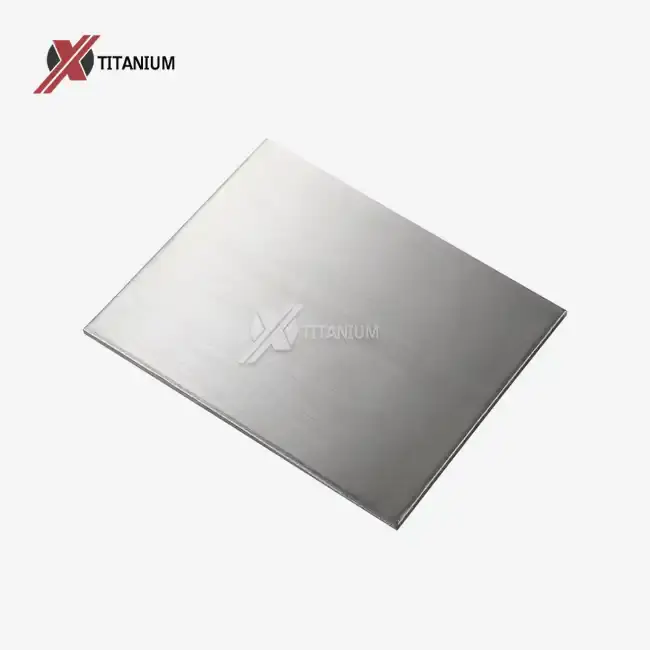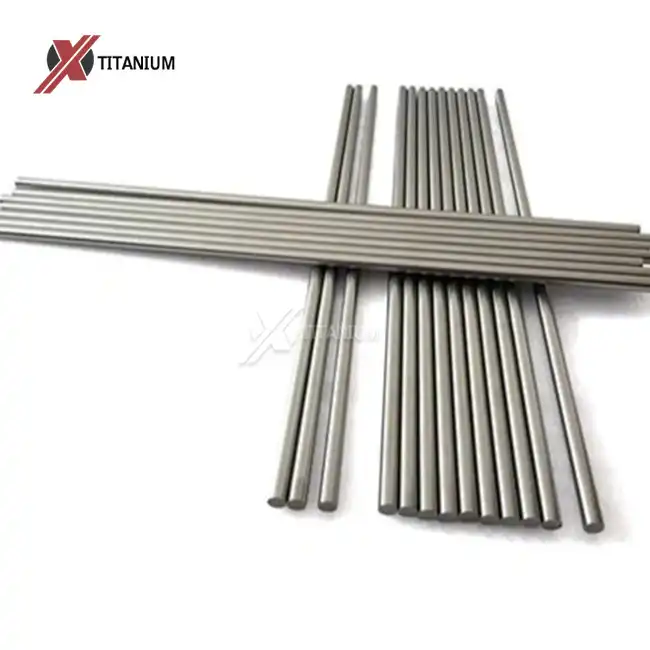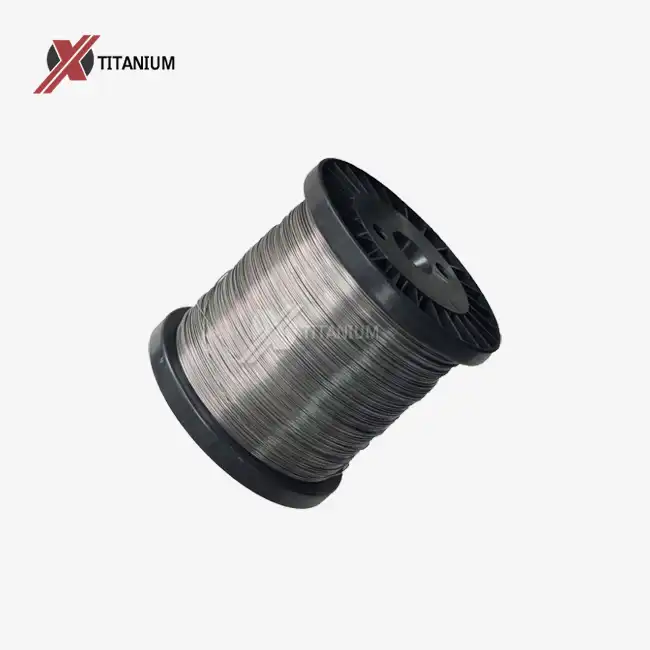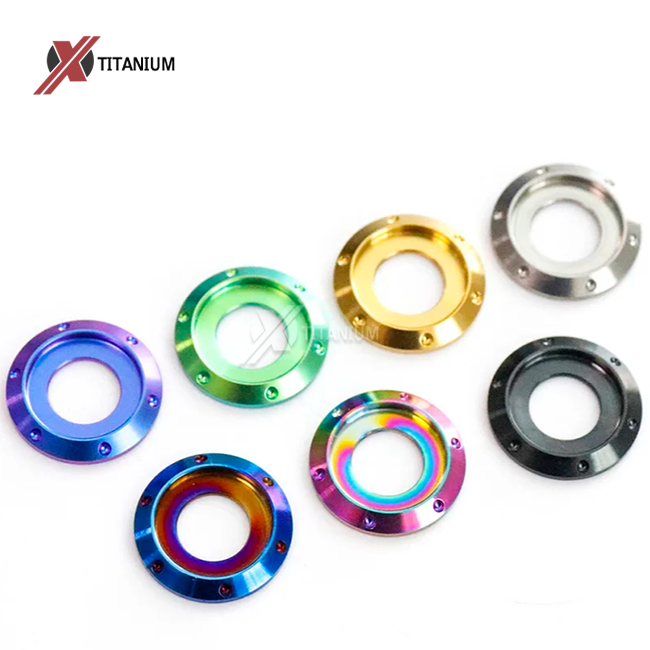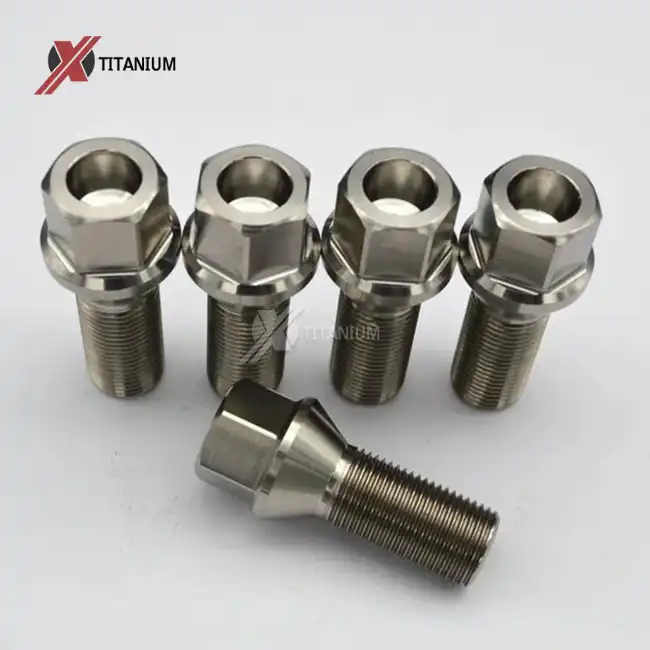The Intrinsic Properties of Titanium Alloy Plates
Titanium alloy plates are renowned for their exceptional characteristics that set them apart in the world of materials science. The foundation of their superiority lies in the unique atomic structure of titanium, which, when alloyed with other elements, creates a material with remarkable properties.
Strength-to-Weight Ratio
One of the most celebrated attributes of titanium alloy plates is their impressive strength-to-weight ratio. This property makes them particularly valuable in applications where weight reduction is crucial without compromising structural integrity. In the aerospace industry, for instance, titanium alloy plates contribute significantly to fuel efficiency and performance enhancement of aircraft.
Corrosion Resistance
The corrosion resistance of titanium alloy plates is another key feature that expands their applicability. These plates form a protective oxide layer when exposed to oxygen, providing a natural shield against various corrosive environments. This inherent characteristic makes titanium alloy plates ideal for use in chemical processing plants, marine environments, and medical implants where resistance to bodily fluids is essential.
Temperature Tolerance
Titanium alloy plates exhibit exceptional stability across a wide range of temperatures. They maintain their structural integrity and mechanical properties in both extremely cold and hot conditions. This temperature tolerance is particularly beneficial in aerospace applications, where materials must withstand the frigid temperatures of high altitudes and the heat generated during high-speed flight.
Customization Techniques for Titanium Alloy Plates
The versatility of titanium alloy plates is further enhanced by various customization techniques that allow manufacturers to tailor these materials to specific applications. These processes enable the optimization of titanium alloy plates for diverse industry requirements.
Alloying and Grade Selection
The selection of specific titanium alloys and grades is a fundamental aspect of customization. Different alloying elements can be introduced to enhance particular properties. For example, Grade 5 (Ti-6Al-4V) is widely used for its excellent balance of strength, ductility, and machinability, while Grade 23 (Ti-6Al-4V ELI) is preferred for medical implants due to its superior biocompatibility.
Heat Treatment Processes
Heat treatment is a crucial customization technique for titanium alloy plates. Processes such as annealing, solution treating, and aging can significantly alter the microstructure and properties of the material. These treatments can be tailored to achieve desired characteristics like increased strength, improved ductility, or stress relief.
Surface Modifications
Surface treatments play a vital role in customizing titanium alloy plates for specific applications. Techniques such as pickling, polishing, and sandblasting can modify surface roughness, enhance corrosion resistance, or prepare the material for subsequent processes. Advanced surface treatments like nitriding or oxidizing can further improve wear resistance and biocompatibility.
Applications of Customized Titanium Alloy Plates
The ability to customize titanium alloy plates has opened doors to a wide array of applications across various industries. The unique properties and adaptability of these materials make them indispensable in many high-performance sectors.
Aerospace and Aviation
In the aerospace industry, customized titanium alloy plates are essential components in aircraft structures, engine parts, and fasteners. Their high strength-to-weight ratio contributes to fuel efficiency and overall performance. Specially treated titanium alloy plates are used in critical areas such as wing structures and engine mounts, where they must withstand extreme temperatures and stresses.
Medical and Biomedical Engineering
The biocompatibility and corrosion resistance of titanium alloy plates make them ideal for medical applications. Customized plates are used in surgical implants, prosthetics, and dental structures. Grade 23 titanium, in particular, is highly valued for its excellent biocompatibility and is often used in orthopedic implants and spinal fusion devices.
Chemical and Petrochemical Industries
In chemical processing and petrochemical industries, the corrosion resistance of titanium alloy plates is paramount. Customized plates are used in reactors, heat exchangers, and storage tanks that handle corrosive substances. The ability to withstand harsh chemical environments while maintaining structural integrity makes titanium alloy plates a preferred choice in these sectors.
Marine and Offshore Applications
The marine industry benefits greatly from the corrosion-resistant properties of titanium alloy plates. Customized plates are used in shipbuilding, offshore oil rigs, and desalination plants. Their ability to resist saltwater corrosion and marine fouling makes them ideal for long-term use in harsh marine environments.
Energy Sector
In the energy sector, titanium alloy plates find applications in both traditional and renewable energy systems. They are used in heat exchangers for nuclear power plants, components of wind turbines, and in geothermal energy systems. The plates' resistance to high temperatures and corrosive environments is particularly valuable in these applications.
Sports and Recreation
The lightweight and high-strength properties of titanium alloy plates have also found their way into the sports and recreation industry. Customized plates are used in the manufacture of high-performance bicycles, golf clubs, and other sporting equipment where weight reduction and durability are critical factors.
Conclusion
Customizing titanium alloy plates represents a significant advancement in materials science, offering a perfect blend of strength, lightweight properties, and adaptability. Through various alloying, heat treatment, and surface modification techniques, these plates can be tailored to meet the exacting demands of diverse industries. From aerospace to medical applications, the versatility of customized titanium alloy plates continues to push the boundaries of what's possible in engineering and manufacturing. As technology advances, we can expect even more innovative applications and customization techniques, further cementing the role of titanium alloy plates in shaping our technological future.
At Baoji Chuanglian New Metal Material Co., Ltd., we specialize in crafting high-quality titanium alloy plates tailored to your specific needs. With over a decade of experience in titanium product manufacturing, we offer customized solutions that meet the highest industry standards. Whether you're in aerospace, medical, or any other sector requiring premium titanium alloy plates, we're here to support your projects. For expert advice or to discuss your titanium alloy plate requirements, please contact us at info@cltifastener.com or djy6580@aliyun.com. Let's elevate your engineering solutions together!
FAQ
What makes titanium alloy plates superior to other materials?
Titanium alloy plates offer an exceptional combination of high strength-to-weight ratio, corrosion resistance, and biocompatibility, making them ideal for various high-performance applications.
Can titanium alloy plates be welded?
Yes, titanium alloy plates can be welded using specialized techniques such as TIG welding in inert atmospheres to prevent oxidation.
Are titanium alloy plates suitable for marine environments?
Absolutely. Their excellent corrosion resistance makes them perfect for marine applications, resisting saltwater corrosion effectively.
References
1. Johnson, R. S., & Weiland, H. (2019). Advances in Titanium Alloy Plate Manufacturing for Aerospace Applications. Journal of Materials Engineering and Performance, 28(3), 1423-1435.
2. Smith, A. D., & Brown, T. L. (2020). Customization Techniques for Titanium Alloy Plates in Biomedical Engineering. Biomaterials Science, 8(12), 3345-3360.
3. Chen, Q., & Thouas, G. A. (2018). Metallic implant biomaterials. Materials Science and Engineering: R: Reports, 87, 1-57.
4. Lutjering, G., & Williams, J. C. (2017). Titanium (2nd ed.). Springer-Verlag Berlin Heidelberg.
5. Peters, M., Kumpfert, J., Ward, C. H., & Leyens, C. (2018). Titanium Alloys for Aerospace Applications. Advanced Engineering Materials, 5(6), 419-427.
